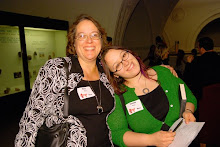 (Cross posted on The Jew and the Carrot)
(Cross posted on The Jew and the Carrot)A few months ago I wrote some tips on
appropriate and helpful ways to bring food to someone who’s ill or grieving. At the time, my mother was in treatment for terminal cancer, and though we were grateful to have an amazing community providing food for us during such a difficult time, I often found myself guiltily throwing out some leftovers that had gotten shoved to the back of the fridge to make room for new offerings. I suggested that people try to bring smaller portions.
Then, on September 9th, my mother passed away, and what had been a slight excess of food transformed into a mountain of baked goods, stacks of trays from kosher restaurants, and Tupperware as far as the eye could see. From the very first day of shiva we were completely overwhelmed with food, and the same women who were coordinating people to bring us meals were having to sort through the fridge and toss or freeze the obscene amount of casseroles, cakes and random snacks that people were bringing when they came to visit with us.
One of the rules of sitting shiva is that the mourners should not prepare their own food, so we had expected to have meals for the week made and prepared by others, but we were not prepared for the sheer quantity of what we ended up with. Among other things, we ended the week with an ant problem in our kitchen because there was so much food sitting out all the time.
Over all, I found shiva to be a difficult but incredibly healing week, and it was wonderful to have so many people showing us their support in so many ways. Still, it frustrates me to see so much food go to waste, and some of the craziness that resulted from having other people run my kitchen for a week was no fun at all. So, here’s some new tips and thoughts on bringing food to a shiva house.
Call aheadTypically meals are arranged for a family sitting shiva, so if you want to contribute, it’s best to find out who’s coordinating the meals, and ask when you could sign up to bring something instead of just showing up with something at random. Unplanned dishes are the ones that tend to end up in the compost heap first.
Plan (farther) aheadIt was a pretty huge shock to go from having so much food we didn’t know what to do with ourselves, to being all on our own as soon as shiva was over. No one really did this, but it would have been so nice to have someone offer to bring us a meal a week after shiva ended, or even two weeks later.
Be aware of kitchen etiquetteIf you’re going to be bringing food or helping out at a shiva house, try to be respectful of the kitchen you’re dealing with, and if you don’t know, please ask. At one point during the week my sister walked into our kitchen to find that someone had taken a sharpie to our Dairy drainer and carefully labeled it ‘MEAT.’ A few days later I noticed that the bin we usually use to store potatoes contained a 9x13 pan, some measuring cups, some silverware, a paring knife, and a sauce pan. Though we only left the house once the entire week, no one who was involved in dealing with the kitchen ever came to us to ask where something belonged, or if something was meat or dairy. When the shiva was over, the amount of reorganizing we had to do was really epic.
Consider a healthy treatIf you really want to bring something unsolicited, consider something homemade and healthy. By far the majority of the food that we received was some variety of baked goods. Now don’t get me wrong, I love cake, and I love bagels, but at a certain point it was just out of control, and in the end, many cakes were tossed half-eaten. Some people opted to bring more unusual and healthier offerings, and those tended to get gobbled up because we were feeling a little overwhelmed by how much sugar we were all consuming. When a friend brought over homemade guacamole before Shabbat, it went quickly. We loved the fancy cappuccino torte and the vegan mango cheesecake was delicious, but every once in a while I just wanted a carrot.
Share a food memoryIf someone from the family indicates that they want to talk, consider sharing a food-related memory. I know how uncomfortable people get at shiva houses. It is sad, and can be awkward to try to express sympathy without resorting to clichés. But food can be a great vehicle to beginning a conversation about the deceased. I was so touched by the number of people who mentioned wonderful Shabbat and holiday meals they had with my mother. People told us about being new in town, and how my mother invited them to eat with our family. They remembered specific dishes she was famous for, and told us about times she brought food to them when they needed support. Those conversations were incredibly meaningful and always so nice to hear; a great improvement over “I’m so sorry for your loss.”











